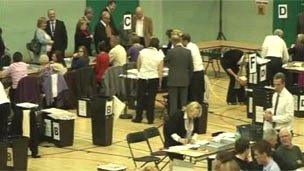Vote 2012: Welsh Labour's best council results since 1996
- Published
Peter Hain: "It's turning into a cracking night for Labour in Wales"
Welsh Labour is making big gains in the local elections, taking overall control in nine of the first 14 councils.
They are the best results Labour has achieved since local government was reorganised in 1996.
The party retook control of former strongholds that it lost in 2008, when it was struggling in the polls.
Plaid Cymru failed to gain overall control of Gwynedd, and Conservatives and Liberal Democrats blamed losses on a difficult time for the UK coalition.
Together with Plaid, the Tories and Lib Dems had a bad night with council leaders from each party losing seats.
Labour regained Cardiff from the Lib Dems and replaced the Tories as the biggest party in the Vale of Glamorgan.
Some 1,200 seats have been contested in 21 of the 22 unitary local authorities in Wales.
Labour celebrated its success with a victory celebration by the statue of NHS founder Aneurin Bevan in Queen Street, Cardiff.
Welsh Labour leader and First Minister Carwyn Jones said: "We have reconnected with people and our community campaigning has resonated with voters right across Wales."
Shadow Welsh secretary Peter Hain, who urged voters to use the elections as a referendum on the Westminster coalition government, said it was very significant that Labour had "taken Tory votes".
"We have won back the Welsh vote from Plaid as well as Tory votes and that's key to winning the general election," said Mr Hain.
Results appeared to back up Labour confidence, although the party is coming from a relatively low base after big losses last time Wales' council seats were contested in 2008.
Winning Cardiff, which had been led by the Liberal Democrats, is a big scalp for Labour. The city's Lib Dem leader Rodney Berman faces a second recount in his ward.
With majorities in Swansea, Newport and Cardiff, Labour has taken its three big target councils in south Wales.
In the north it failed to win outright control of Wrexham and Flintshire, but made gains to strengthen its position as the biggest party in both.
The party comfortably held Neath Port Talbot, winning 52 seats, up from 35 previously.
Andrew RT Davies was optimistic despite 'very disappointing' results
Labour sources set their sights on leading or controlling enough councils to take the leadership of the Welsh Local Government Association.
However, Labour was reported to have lost its leader in Rhondda Council Taf, Russell Roberts.
The Welsh Conservatives lost their majority in Monmouthshire, falling three seats short of the 22 they needed to secure outright control.
They also lost control of the Vale of Glamorgan, with Labour now the largest party but without an overall majority, and its leadership of Newport.
The Conservatives' leader in the Welsh assembly, Andrew RT Davies, said the Welsh Tories suffered a "setback" because of a "difficult national backdrop".
"The message need to be clearer, it needs to be crisper and people need to know that the job we are trying to undertake isn't something that can be done in the blink of an eyelid," he added.
"I think we have to see a setback, there's no doubt about that.
"Ultimately we tried to fight a local campaign but we have to accept it was a mid-term decision that most people took."

The first full result announced in Wales was in Wrexham, where Labour made large gains
Welsh Lib Dem leader Kirsty Williams, whose party suffered heavy losses, said attention had been focused on Westminster politics and that voters had sent the UK government a message.
"I think it's clear that our colleagues in Westminster are taking some tough decisions and the benefits of those tough decisions are yet to be felt," she added.
Plaid Cymru had been playing down expectations of doing well under its new leader Leanne Wood, who was elected in March, saying the elections came too early in her tenure to be seen as a verdict on her.
Plaid had hoped to gain overall control in Gwynedd, one of its heartland areas, but fell one seat short.
Before the Gwynedd result was announced, Ms Wood said it was a difficult night and that it was now "time to rebuild".
Speaking to BBC Wales, Plaid AM for Mid and West Wales Simon Thomas said Ms Wood could not be blamed, insisting the party had enjoyed "some successes" but on the whole it had been "a disappointing night".
"But, to be fair, it's a bit like the weather itself, it's mostly drizzle with some outbursts of sunshine and we've got to look for the success I think we will have by the time all the votes are counted," he told BBC Wales.
Mr Thomas admitted Plaid had "tipped down" in Caerphilly after its leader, Allan Pritchard, was ousted and said the party was not as "rigorous or professional" on the ground as it needed to be.
Mr Hain's office would not be drawn on unconfirmed reports that he would quit after the election.
Asked if the Neath MP intended to stand down, a source close to him said: "Not straight away. We don't want to comment on what might happen when there's a reshuffle."
He added: "There's not going to be a reshuffle today or this weekend. All the reshuffle speculation is on Cameron."
Some authorities were not due to declare results until Friday afternoon.
Elections in Anglesey, where ministers have put commissioners in charge after years of political infighting, have been postponed until next year.
<bold>All the latest election results are available at </bold> <link> <caption>bbc.co.uk/vote2012</caption> <altText>BBC Vote 2012 special report and results service</altText> <url href="http://www.bbc.co.uk/news/uk-politics-17270000" platform="highweb"/> </link>
- Published5 May 2012
- Published4 May 2012
- Published4 May 2012
- Published4 May 2012
- Published4 May 2012
- Published4 May 2012
- Published3 May 2012
- Published5 May 2012
- Published1 May 2012
- Published5 April 2012